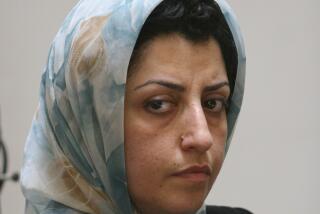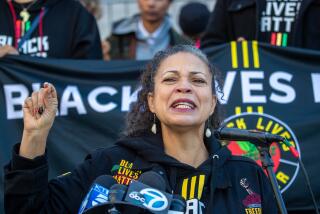Activist Cleared of Defaming Egypt
- Share via
CAIRO — Saad Eddin Ibrahim, a prominent pro-democracy activist, was acquitted by Egypt’s highest court Tuesday after a third trial on charges that he defamed the nation and embezzled funds. The court voided an earlier seven-year prison sentence.
Ibrahim, 64, who has both U.S. and Egyptian citizenship and has taught at UCLA and other U.S. universities, drew widespread support from human rights organizations after his arrest in June 2000 and his convictions in two previous trials, which were overturned on procedural grounds. Amnesty International called his arrest politically motivated and an attempt to thwart democratic reform.
The courtroom erupted in cheers when the judge announced the verdict in the latest trial.
“Thank God! Thank God!” shouted Ibrahim, who had been free pending the retrial.
A few minutes later, he took a cell phone call from U.S. Ambassador C. David Welch, who told him: “Saad, this is a great day for you and your family. I am very happy.”
Why Ibrahim was arrested in the first place remains something of a mystery. His positions on most issues did not much diverge from those of the Egyptian government. He favored peace with Israel, good relations with the United States, a secular state and free-market reform. He was critical of tight controls on freedom of expression here, but so are many educated Egyptians.
Ibrahim has told friends that he thinks his problems stemmed from his decision to set up a committee to monitor parliamentary elections in 2000 and from reports published by the Ibn Khaldun Center for Development Studies, which he ran. The reports accused the government of rigging elections in 1995. He also gave an interview to a Saudi magazine saying that Middle East governments had royal tendencies even if they weren’t run by monarchs.
During the most recent trial, the prosecutor called Ibrahim -- a sociologist who is on the faculty of American University in Cairo -- “a professor of lies and deception, who sold out all of Egypt.” He accused Ibrahim of tarnishing Egypt’s image and illegally accepting and misusing funds that the European Union gave the now-closed Ibn Khaldun Center for election monitoring. The EU has said in an affidavit that there was no misuse of its $250,000 grant.
After Ibrahim’s conviction last July in a second trial, President Bush threatened to block additional American aid to Egypt -- beyond the nearly $2 billion a year this nation already receives -- if the charges stood.
On Tuesday, Ibrahim called his acquittal “a victory for democracy” and said he had been freed for “purely legal reasons” and not because of any foreign pressure.
Ibrahim, who suffers from a neurological disorder and had spent eight months in prison, looked weak when he walked into court holding the hands of two friends for support. His American-born wife, Barbara, is currently in the United States.
Ibrahim said he planned to continue campaigning for freedom and human rights but was unsure whether he would reopen the Ibn Khaldun Center.
Said his friend Ali Salem, an Egyptian writer: “Thinking in the Third World is dangerous.”
*
Times special correspondent Hossam Hamalawy contributed to this report.
More to Read
Sign up for Essential California
The most important California stories and recommendations in your inbox every morning.
You may occasionally receive promotional content from the Los Angeles Times.













